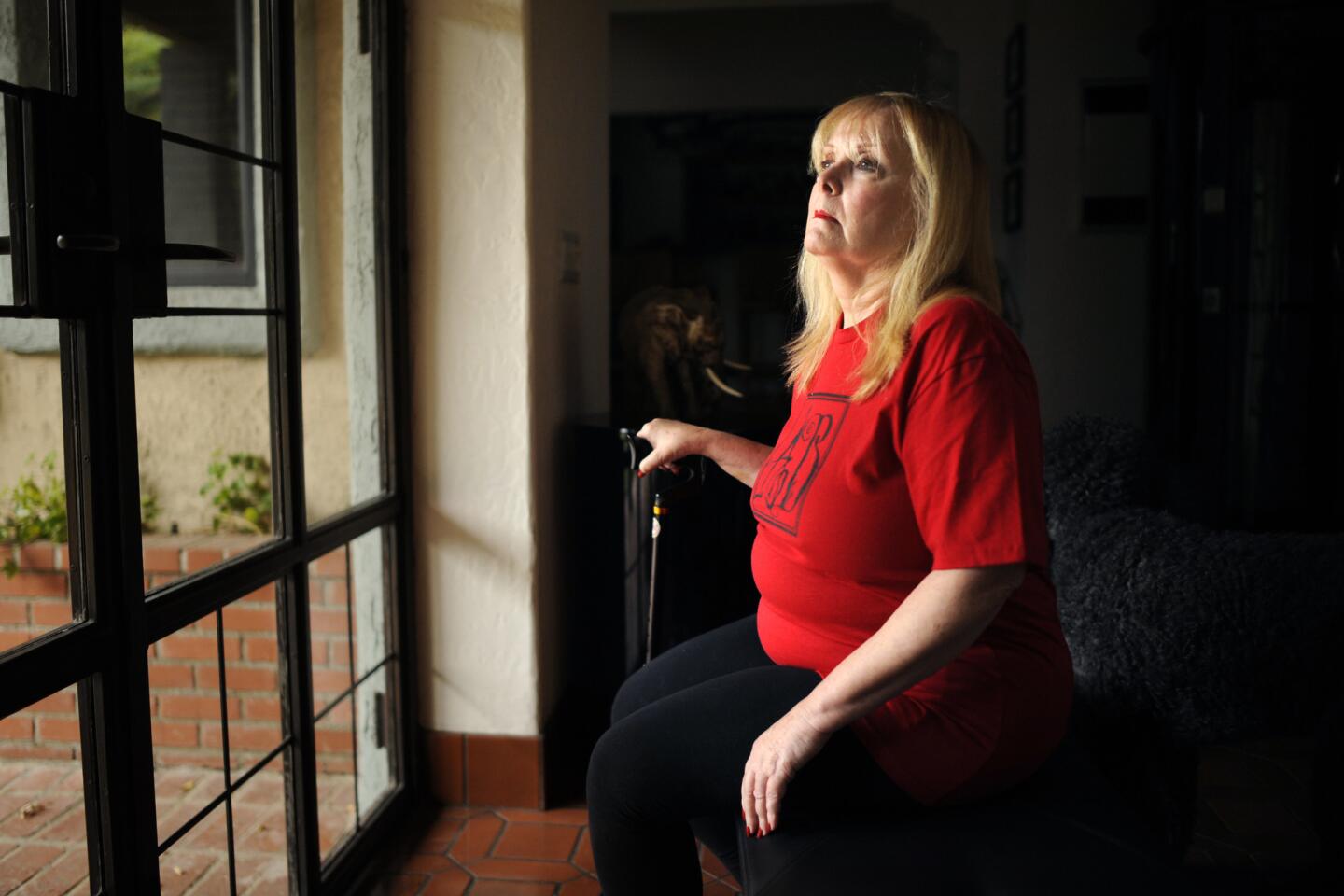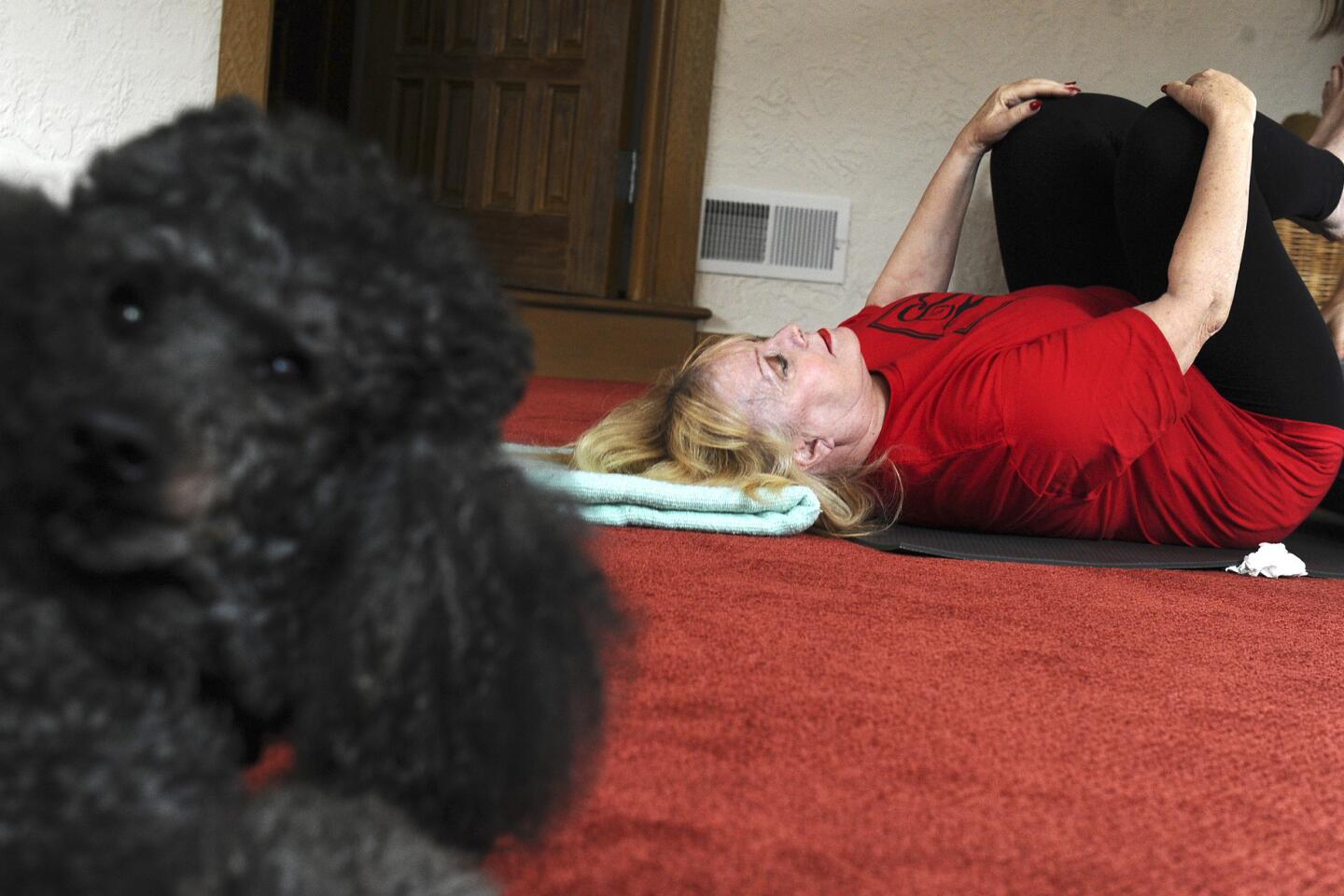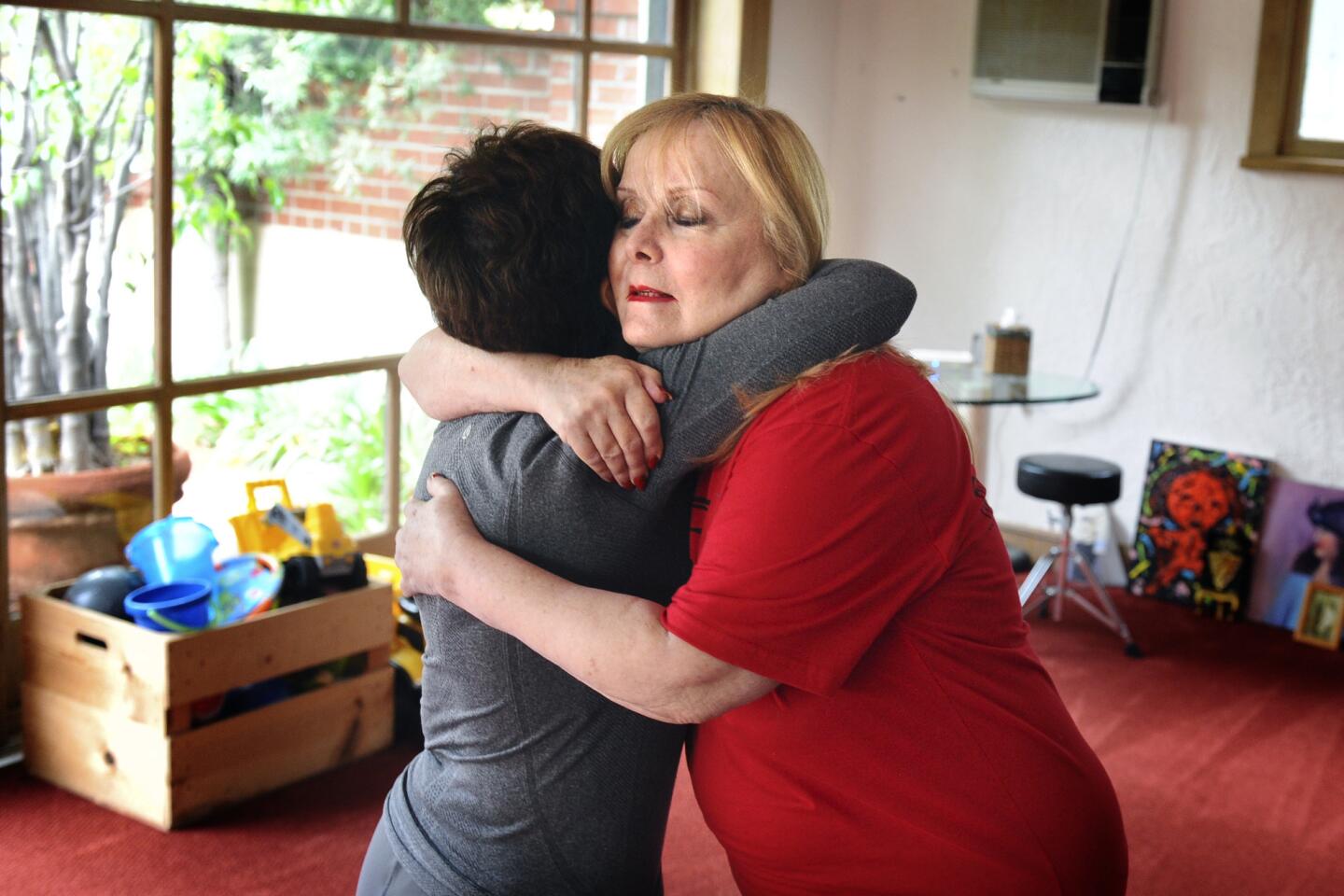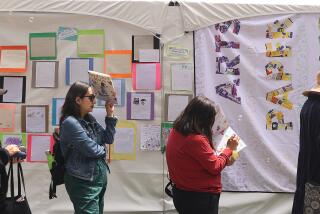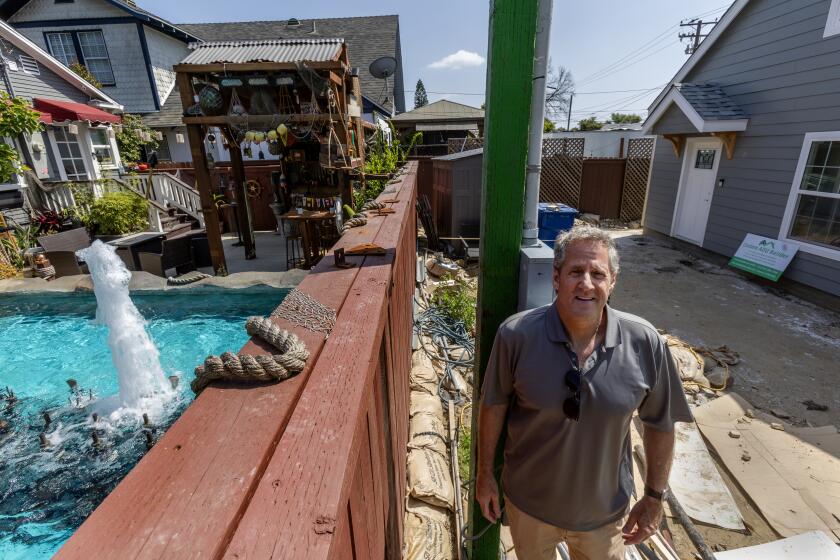Great Read: Brain cancer takes a toll, but unlocks her creativity
Judi Kaufman was having a bad day. There were more and more of those now, 18 years into her battle against brain cancer.
A tumor, her third, now the size of a golf ball, was encroaching on healthy brain tissue, upending her balance and her speech. Her walking was shaky and her stamina was depleted. Usually generous with greetings and hugs, on this gloomy December day she didn’t feel like coming to the door to welcome a visitor.
Cancer wasn’t something she had wanted in her life, either, but she had learned to embrace it. She called her tumor “Friendly,” and tried to understand the strange gifts it offered — even as it took so much away from her.
Yes, Friendly had destroyed the part of her brain that let her compute numbers, making it impossible for her to cook, something she had always loved.
But the invader in her frontal lobe also loosened her up. She started writing poetry: meditations on cancer and death and sex and religion and all other sorts of topics that her old self would have thought better left untouched.
“I lost all my inhibitions as a result of the cancer,” said Kaufman, 70. “I had been a prude, but it’s all changed.”
She was sure that brain cancer had made her a better person. She found a purpose, creating a charity that helped other patients, encouraging them to explore their creative capacities too and raising more than $7 million for research.
But now, with no tolerable treatment options left to stall her disease and little idea how the next few months would unfold, it had become hard to work and to see people — even to read a book.
“I’m in a wait pattern,” she said. “I don’t know how to plan my life. That’s the hardest part.”
Kaufman still composes poetry, when she can. She talks and a trusted assistant types out her thoughts.
In a poem she wrote in June, “World War III,” Kaufman depicts herself as a warrior.
My boots are on the ground.
Kinky boots.
I zip up my uniform.
I put on my helmet
To cover up my brain tumor.
People are afraid,
And so am I,
To acknowledge we’re in World War III.
::
Kaufman is devoted to her husband, Roy, their two daughters and their two grandsons. She lives in a large Spanish-style home in Beverly Hills that backs up to a school, and the playful shouts of children provide the soundtrack for her day. A 50-pound standard poodle named Chakra is always at her side.
She’s the kind of gracious hostess who on an easier day in November donned a scarf and bedazzled Fitflops and offered mixed nuts — the fancy kind — in a glass dish.
Delighted to see a reporter dive straight for the macadamias, Kaufman complained that too often, guests won’t touch the snacks she serves.
“Why won’t people eat the nuts?” she had asked, Jerry Seinfeld-style.
Kaufman used to be a whiz in the kitchen — testing recipes and running a company that sold mail-order pizzas made of chocolate. She taught etiquette classes for executives and kids.
For decades, she had been a lay leader for the American Jewish Committee, an advocacy group. In her office, photos of her with luminaries such as Steven Spielberg line the walls.
When illness struck, everything changed.
Kaufman’s cancer is a relatively rare, slow-growing type called oligodendroglioma. It takes over the cells that create the fatty sheathing that lets brain circuits signal clearly, said UCLA neuro-oncology Director Dr. Timothy Cloughesy, one of Kaufman’s doctors and now a friend.
The disease strikes people at their core: transforming personalities, relationships and self-images from the inside out.
“Brain cancer is particularly devastating for patients and their families,” Cloughesy said, “not only because it takes people’s lives but because it affects their brains the way it does.”
Cloughesy and Kaufman’s other physicians excised her tumor, irradiated it and used chemo to blast it away — but it always came back.
Over the years, Friendly didn’t only take away Kaufman’s ability to compute numbers. She had to relearn how to speak and how to walk.
It has been a rough road, but poetry has rescued her.
In verse, Kaufman has picked apart her relationships and described her desires. She has written about cancers as pregnancies. About life passing her by.
“My brain is handcuffed to a chair,” she noted in “How Things Look” (2007):
My heart is laid out on a table.
I have a permit to carry milk.
I am an art dealer.
Inside the car the police radio squawks to attention.
Still alive, I am supposed to have a honeymoon.
I scan the crowd as it moves past me.
Kaufman said she launched her charity, Art of the Brain, to benefit Cloughesy’s brain cancer research and to get other impaired patients in touch with the new creativity lurking within. The group brings together a community of patients and “Brain Buddies” who help them through diagnosis and treatment and, in many cases, encourage creative pursuits.
Last year, patients’ artwork — photos, paintings, crayon drawings and more — was displayed at the charity’s annual gala at UCLA.
Kaufman has figured out how to “own” her condition, Cloughesy said.
“I think it was hard for Judi to be impaired,” he said. “And she just accepted it and took it on and developed into this person with this goal, with this interest and a generous heart. Things just crystallized for her.”
Kaufman would agree.
“I’m glad I had brain cancer,” she said. “I always wanted to do good work. It’s hard to find good work.”
::
Late to an appointment, Kaufman shakily descended from her bedroom via a glass-walled elevator Roy had installed for her.
She had wanted to stay in bed and watch TV, but the visitors were here, and she had a yoga lesson with her friend Debbie Saidoff. She wore a red “Art of the Brain” T-shirt for photos. An assistant had done her makeup, special for the day.
Kaufman thinks producing art gives brain cancer patients a new sense of purpose and worth when so much of what they had been good at is gone.
Cloughesy sees another benefit.
“I think creativity does help people want to survive,” he said. “But it’s more about using art to create this tangible thing, to realize what we lose.”
Cloughesy has used funds raised by Art of the Brain to build a searchable collection of tissues, MRI scans and clinical records from 10,000 UCLA and Kaiser Permanente brain cancer patients. He hopes it will help researchers learn more about the disease — and, like the artwork, keep patients in the public eye.
“It’s a legacy, it continues on, it’s part of the answer,” he said.
Neither Cloughesy nor Kaufman is sure how much longer she has to live.
Kaufman says she isn’t afraid to die. She’s planning her burial so Roy won’t have to — making calls to the worker at the mortuary who will arrange for her pine casket: spray-painted bright red for courage.
“Joe’s my friend now,” she said.
Other friends are more squeamish about talking of the end, and Kaufman tries to respect that. “I try to have a seizure quietly,” she said.
Bit by bit, she is saying goodbye to things she once loved, like visits to Carmel. After a recent trip there was scuttled at a doctor’s suggestion, she no longer wanted to go back.
“I’ve been enough,” she said. “Now I watch Anthony Bourdain. I imagine: I’m in Iran, sitting on cushions, drinking tea.”
::
Saidoff soon arrived for yoga, as well as their teacher, Maria Cristina Jimenez, whom Kaufman had met in a writing class years before.
They set up in a sunny annex facing a manicured courtyard and pool, Chakra flopped down on the floor near their mats.
Saidoff moved through poses, while Kaufman took the class seated in a chair. They chanted their “oms.” They joked about “The Real Housewives of Beverly Hills,” which they had all been watching.
“Do the headstand!” Kaufman barked at Saidoff.
She had been boasting all day about how good her friend was at it.
The women held hands during resting poses. Kaufman started to look stronger.
Jimenez offered a message for the class.
“Take a moment and live your life as it is today. Not as you think it should look, but how it is today,” she said. “Nothing has to look one way.”
“Nothing has to look one way,” Kaufman repeated after her, looking across the room at no one in particular.
“Maybe I don’t have cancer,” she said — half joking, and perhaps half willing it to be true.
Twitter: @LATerynbrown
More to Read
Start your day right
Sign up for Essential California for news, features and recommendations from the L.A. Times and beyond in your inbox six days a week.
You may occasionally receive promotional content from the Los Angeles Times.

